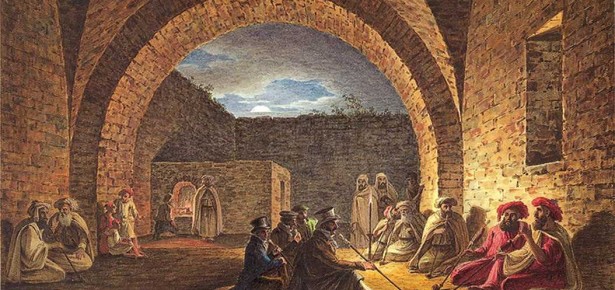
I love a good story, which isn’t the easiest thing for a historian to admit. When I was sitting in the archives tracking down statistics on the volume of tobacco moving through the Baltic, I came across an interesting batch of documents that slowly revealed a really good one. It was about John Elton, a British seaman who entered Nader Shah’s service in Iran and managed to both anger his fellow British merchants and the Russian government. I first came across his life when he appeared in an appeal to the British government by the Russia Company, where one of his former colleagues described him as “the most improper person in the Universe,” so I was hooked.
Enterprising Empires: Russia and Britain in Eighteenth-Century Eurasia is a look at the relationship between Great Britain and Russia but told through the experiences of individuals like John Elton. Throughout the century, Russia maintained a dominant advantage in the trade relationship between the empire, because the balance of trade was heavily in its favor and Britain remained dependent on Russian products to maintain its naval strength, including hemp, flax, pitch, and tar. Russia held a stronger hand in all negotiations between the two. It’s an important argument, since it challenges the traditional argument of Russia’s economic “backwardness.” Russia’s eighteenth-century economy was as robust and successful as any state in Europe.
Most of the individuals interfering in the relationship between Britain and Russia worked for the British Russia Company. The company was established in the sixteenth century but was completely transformed at the end of the seventeenth when its membership was opened to anyone capable of paying a nominal fee. The company’s merchants had profits in mind, but their lives in Russia provided the British government a group of informants that proved valuable in any diplomatic negotiations between the empires. The attempts of the Russian Company to intervene in Russia’s Ottoman trade, to access Russia’s Iranian trade, or to benefit from Russia’s relationship with China predict the “Great Game” conflicts over these same spaces in the nineteenth century.
One of the surprises of my research was that this information was not only valuable to Britain but also to Russia. These same men also proposed Russian colonial expansion into northern China, provided advice about accessing Japan and the North Pacific, and assisted Russian admission to Iran and the Middle East. The networks of knowledge that connected Russia and Britain through the actions of these merchants were integral to both countries’ imperial successes and shaped their uneasy diplomatic rivalry. It may not have been the goal of individuals to promote international tensions, but the contest of empires that defined the nineteenth century had its roots deeply imbedded in the actions of men in the eighteenth.
Which takes me back to John Elton. Leaving his work for the Russia Company in Iran, and enlisting in the shah’s service, was a personal choice. But the consequences of that act would ultimately play a role in Russia’s decision to ignore its historical alliance with the British when it entered the Seven Years’ War. Personal actions had geopolitical consequences, and that’s a story worth reading.
Latest Comments
Have your say!